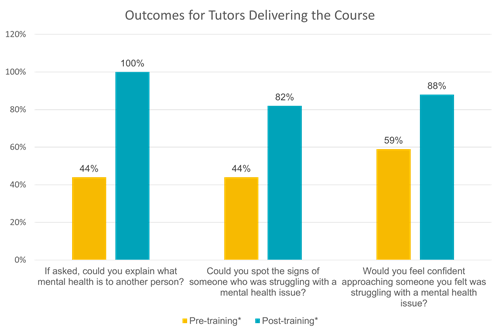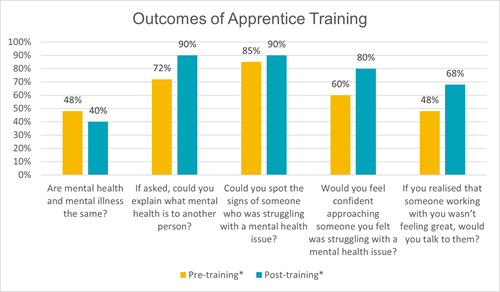Today’s apprentices are tomorrow’s workforce and business owners
Our Let’s Talk Mental Wellbeing Programme for apprentices aims to increase awareness of mental health and wellbeing, to instil a confidence amongst apprentices in knowing where to seek support themselves, and how to start and manage that difficult conversation about mental health in order to break down the stigma that surrounds it.
“Extremely beneficial. Should be more widely shared within organisations. Education enables people to feel they can talk about how they are actually feeling.”
Male apprentice
Employer, Swindon
Why is it important to support apprentices?
Apprentices face a huge learning curve whilst also experiencing changes in their personal lives. During the adjustment from a college environment, they are also learning about their trade in terms of theory in the classroom as well as throughout their practice on site. In addition, they may have moved away from home for the first time, they will be making new friends, it could be their first time in a job which includes learning to manage money, pay bills, undertake practical tasks like cooking, booking medical appointments and so on.
At Mates in Mind, we found that of 550 apprentices surveyed:
- 73% had felt stressed at least once in the previous week.
- Only 33% said their employer/colleague would notice signs of mental ill-health in others (the rest said no or unsure).
- 70% had NEVER taken part in any mental health training and yet 91% said they thought training would help them to manage their own mental health.
- Only 55% said they would reach out to someone if they were experiencing stress, depression or anxiety.
When young apprentices enter the workplace, there is awareness that they are at a heightened risk in terms of their own safety. But often, the risk in regard to their mental health is not considered. This is especially true because these apprentices are entering a profession that has shocking statistics regarding mental health:
- A third of construction workers live with severe levels of anxiety.
- Workers in construction were at some of the highest risk of suicide in the country, at 3.7 times higher than the national average. For men working in skilled trades, the highest risk was amongst those in building finishing trades who had more than double the suicide risk of the male national average.
- In 2021, 507 people working in construction ended their life through suicide.
This is why we advocate for embedding mental wellbeing training into all apprenticeships so that together we can prepare future workers, line managers and business owners (approximately 35% of apprentices go on to run their own business) and create a legacy of wellbeing. By providing young people with the skills, knowledge and tools, they can help to build safer workplaces for themselves and others.
What is the Let’s Talk Mental Wellbeing Programme?
This is a holistic programme working with the apprentices, their colleges and employers, through the support provided by programme sponsors.
For apprentices
Our academically evaluated programme is specifically designed with apprentices in mind. We facilitate workshops and provide resources for students to raise awareness of mental health. From practical self-help to training and tutoring sessions to prepare them for entry into the industry it addresses the pressures both societal and more personal that students are facing. In these sessions, they can learn to spot the signs of declining mental health in themselves and others.
For colleges
We support staff working in colleges offering construction related courses across the UK to deliver the sessions. We do this through a Train the Tutor model and by providing all the course materials and tutor notes to ensure it becomes embedded into the college curriculum and available to all students throughout their studies.
For employers
It is vital that employers and managers are aware of some factors, particularly in regard to mental health, which might affect the smooth transition of apprentices from education into employment. Therefore, to ensure that workplaces are prepared for, and best able to support, their apprentices we provide a handbook that includes the key information.
At the same time, we educate, train and support employers and all of their employees, including apprentices and new entrants, across the whole workforce to ensure there is a continuous and comprehensive solution in place so that no-one reaches crisis point and mental health awareness becomes everyone’s issue.
What is the outcome of the programme?
In order to deliver an effective programme for this historically hard-to-reach group, we surveyed a group of apprentices from across the UK about mental health both before and after the delivery of a pilot apprentices training course around the topic. The course had an overwhelmingly positive response from both the employers who facilitated our delivery and the apprentices who participated – and the results showed a significant improvement in a number of the measures of understanding and confidence around the topic:
* Percentage represents the number of apprentices responding ‘yes’ to the question.
“The training with the apprentices ran very well. They were receptive to the training with personal experiences of their own. This is a great initiative because the apprentices are just starting their career and I expect as a result of their training they will be supporting the mental health of themselves and their teams for the next 40-50 years.”
Michael
Associate, Tutor
We also found that the Tutors delivering the courses also develop their knowledge and confidence:

* Percentage represents the number of Tutors responding ‘yes’ to the question.
 Tutor recommendation rate for the course: 4.9 out of 5.0
Tutor recommendation rate for the course: 4.9 out of 5.0
“Excellent – great delivery. Engaging with a good mix of interaction and videos / visual aids.”
Female apprentice
Employer, Swindon
The ESG and CSR benefits for programme sponsors
Supporting apprentices to become mentally resilient is important as it benefits the apprentice, their employer, their colleagues and the wider local community. For organisations sponsoring a college to deliver this programme there is also a benefit in terms of both Environmental, Social and Governance (ESG), as well as Corporate Social Responsibility (CSR).
Our partners
With the support of B&CE’s Mowlem grant in 2018, we developed a training course to raise awareness of mental health in construction apprentices as part of the wider Mates in Mind programme. Since then, the training has been piloted in many colleges and is now being rolled out across the UK, including the whole of Scotland thanks to the support of the Scottish Building Federation supported by B&CE Charitable Trust.
This programme is made possible through the continued support and commitment of the following colleges and organisations:

How to get involved
If you're interested in finding out more about how we can help you - whether you're part of a college, a business taking on new apprentices or an organisation looking to bring in more support for its employees - please fill out our contact us form to request a callback.
To find out more about becoming a Mates in Mind Supporter, please visit our Supporter page or click the button below and one of our dedicated Support Managers will get in touch to schedule an introduction call.

